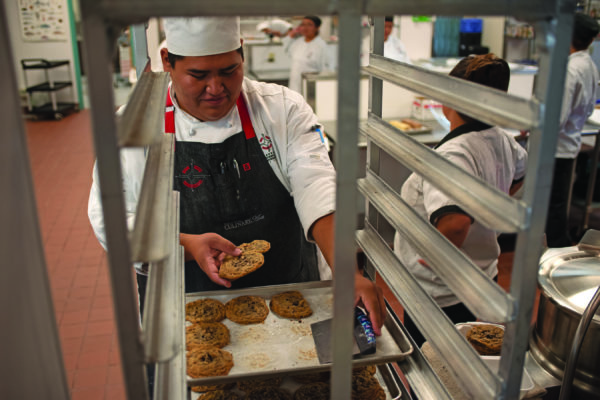
- Details
- By Native News Online Staff
CROWNPOINT, N.M. — Navajo Technical University’s Culinary Arts and Professional Baking programs were granted five year re-accreditations with the American Culinary Federation (ACF) after achieving a zero non-compliance evaluation from an ACF visiting team in November.
The visit lasted three days and included a review of program curriculum, safety and sanitation, equipment and facilities, and knowledge and skills competencies. The visiting team consisted of three certified executive chefs, including Mark Cochran of Stillwater, Oklahoma, Dana Baldwin of St. Augustine, Florida, and Carlton Brooks of Phoenix, Arizona.
“The American Culinary Federation has been around for 90 years and has become an important part of culinary education in the past ten,” explained Chef Brooks, a certified executive pastry chef and member of the prestigious American Academy of Chefs. “A student that goes through an accredited school is more ahead of their peers, meaning they’re going to be the first ones to have their resumes looked at. They’re on their way to executive chef status and are guaranteed a job.”
NTU first earned athree-year accreditation with the ACF in 2011 and was extended another five years after a visit in 2015. Paperwork involving the most recent visit is expected to be completed by the ACF’s Education Foundation’s Accrediting Commission in January, after which, NTU will receive a formal notification letter.
NTU’s Culinary Arts and Professional Baking programs are the only at a tribal college and university to hold accreditation with the ACF, and one of two existing programs in the state of New Mexico. Over 17,000 members participate in the ACF representing nearly 200 chapters throughout the United States. Accreditation ensures employers that students have met the required level of competency set forth by the ACF.
“The students know what they’re doing,” stated Chef Brooks, who is also a certified culinary educator with the ACF. “They’re being trained properly and they’re going out and getting jobs. [NTU] is giving students an opportunity to advance their career because they create a student whose mind is focused.”
The ACF offers 14 individual certification chef designations, which each require specific qualifications. Certifications are based on education and work experience, and include categories for cooking professionals, personal cooking professionals, baking and pastry professionals, culinary administrators and culinary educators. For more information about NTU’s ACF accredited Culinary Arts and Professional Baking programs, contact Chef Robert Witte at [email protected].
More Stories Like This
Native News Weekly (August 25, 2024): D.C. BriefsUS Presidents in Their Own Words Concerning American Indians
Native News Weekly (December 14, 2025): D.C. Briefs
Wounded Knee Massacre Site Protection Bill Passes Congress
Two Murdered on Colville Indian Reservation
Help us defend tribal sovereignty.
At Native News Online, our mission is rooted in telling the stories that strengthen sovereignty and uplift Indigenous voices — not just at year’s end, but every single day.
Because of your generosity last year, we were able to keep our reporters on the ground in tribal communities, at national gatherings and in the halls of Congress — covering the issues that matter most to Indian Country: sovereignty, culture, education, health and economic opportunity.
That support sustained us through a tough year in 2025. Now, as we look to the year ahead, we need your help right now to ensure warrior journalism remains strong — reporting that defends tribal sovereignty, amplifies Native truth, and holds power accountable.
 The stakes couldn't be higher. Your support keeps Native voices heard, Native stories told and Native sovereignty defended.
The stakes couldn't be higher. Your support keeps Native voices heard, Native stories told and Native sovereignty defended.
Stand with Warrior Journalism today.
Levi Rickert (Potawatomi), Editor & Publisher

